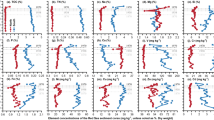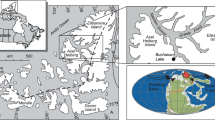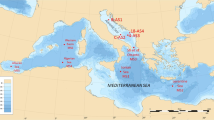Abstract
IN a recent communication, Pettersson1 estimated the rate of accumulation of nickel on the Earth from extra-terrestrial sources on the basis of the nickel-bearing particles caught on niters located on the summits of two Hawaiian volcanoes. His value for the rate of accumulation of extra-terrestrial nickel is 6.5 × 1011 gm./yr. for the Earth as a whole. If the rate of accumulation is reasonably constant over the Earth's surface, then this figure corresponds to 33 × 10−6 gm. nickel/cm.2 of the Earth's surface/1,000 yr.
This is a preview of subscription content, access via your institution
Access options
Subscribe to this journal
Receive 51 print issues and online access
$199.00 per year
only $3.90 per issue
Buy this article
- Purchase on Springer Link
- Instant access to full article PDF
Prices may be subject to local taxes which are calculated during checkout
Similar content being viewed by others
References
Pettersson, H., Nature, 181, 330 (1958).
Broecker, W. S., Turekian, K. K., and Heezen, B. C., Amer. J. Sci., 256, 503 (1958).
Author information
Authors and Affiliations
Rights and permissions
About this article
Cite this article
TUREKIAN, K. Rate of Accumulation of Nickel in Atlantic Equatorial Deep-Sea Sediments and its Bearing on Possible Extra-Terrestrial Sources. Nature 182, 1728–1729 (1958). https://doi.org/10.1038/1821728b0
Issue Date:
DOI: https://doi.org/10.1038/1821728b0
This article is cited by
Comments
By submitting a comment you agree to abide by our Terms and Community Guidelines. If you find something abusive or that does not comply with our terms or guidelines please flag it as inappropriate.



